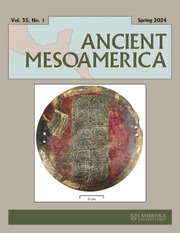Article contents
OUT OF CONTROL? RETHINKING ASSUMPTIONS ABOUT WEALTH GOODS PRODUCTION AND THE CLASSIC MAYA
Published online by Cambridge University Press: 07 August 2014
Abstract
Objects crafted from jade played a prominent role in pre-Columbian Mesoamerica from at least the Middle Formative period (ca. 1000–400 b.c.). Based primarily on the consumption of jade artifacts by Classic Maya elites, scholars have argued that their production was under the direct control of elite members of society. Recent research in the middle Motagua Valley and elsewhere in Mesoamerica suggests that that the production of wealth goods varied much more widely than previously assumed. These data and subsequent technological analyses indicate that jade artifact production took place in a variety of domestic and nondomestic, as well as elite and nonelite, contexts. In particular, the current evidence from the middle Motagua Valley suggests that households at all levels of the local social hierarchy were engaged in the production of jade beads and preformed blanks intended for final-stage production elsewhere. This evidence runs counter to many previous models of wealth goods production, which have viewed such production as an elite-dominated activity. This article brings together recent evidence from the middle Motagua Valley, Guatemala, to propose new ways of conceptualizing the place of elites in Classic period Maya wealth goods production and the extent of their role in controlling ancient economies. The current evidence suggests that we need to evaluate models of wealth goods production in regard to specific temporal and spatial circumstances.
Information
- Type
- Special Section: New Perspectives on Ancient Mesoamerican Economies
- Information
- Copyright
- Copyright © Cambridge University Press 2014
References
REFERENCES
- 11
- Cited by

